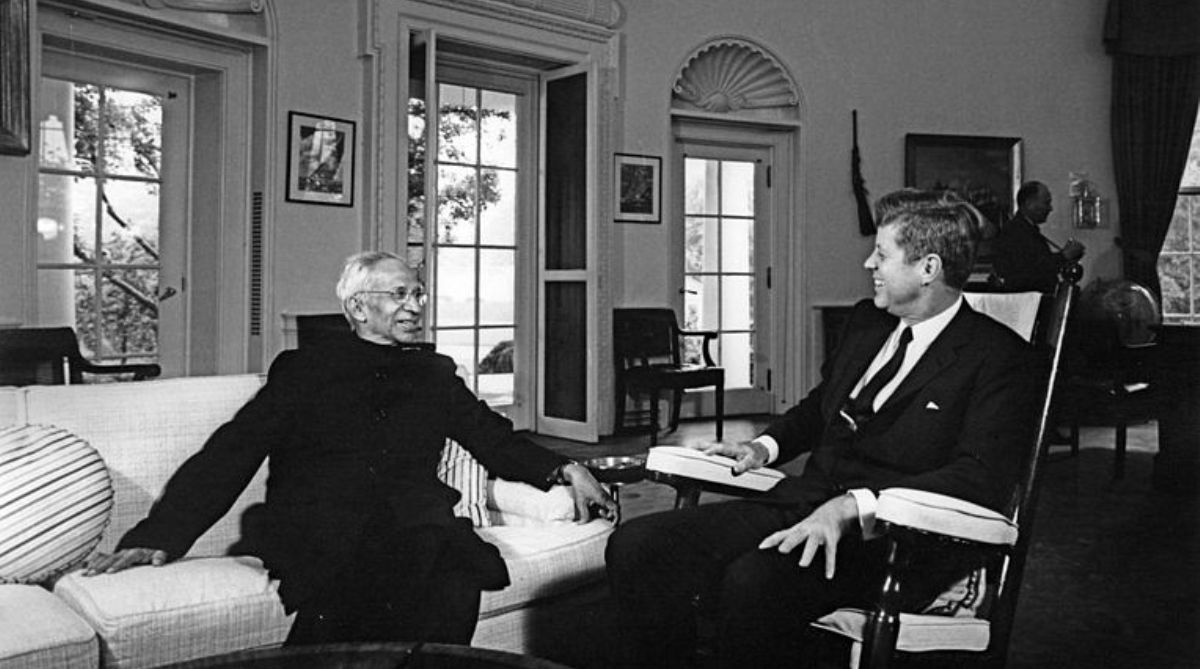PM expresses joy as Assam’s Charaideo Maidam lands in UNESCO Heritage list
The Maidams at Charaideo showcase the glorious Ahom culture, which places utmost reverence to ancestors, Mr Modi said.
When he became the President, his students and friends wanted him to let them allow the celebration of his birthday. He replied, “Instead of celebrating my birthday, it would be my proud privilege if September 5th is observed as Teachers’ Day.”

President John F. Kennedy (in rocking chair) with President of India, Dr. Sarvepalli Radhakrishnan. (Wikimedia Commons)
“When we think we know, we cease to learn.”
The words were spoken by the first Vice-President and second President of India, Dr Sarvepalli Radhakrishnan.
An author, a politician and most of all an academician, Dr Radhakrishnan was one of the most distinguished people of India of the twentieth century.
Advertisement
Perfectly at ease in both Indian and Western philosophies, he was often addressed as the bridge builder between India and rest of the world.
Dr Sarvepalli Radhakrishnan was born on September 5, 1888, in a Brahmin family in Madras. His father was a revenue official under a local zamindar.
Being educated mostly in Christian missionary schools, Radhakrishnan found a common ground between the religion he practised and the religion he witnessed every day in his school and college.
After completing his Masters in Philosophy from Madras Christian College, he secured a temporary teaching position in Presidency College, Madras.
He gave lectures on a variety of topics including Psychology and European Philosophy. Many journals like The Guardian Press and Modern Review published his works.
But it was his article, “The Ethics of the Bhagavadgita and Kant” in The International Journal of Ethics that made him known initially to the western audience.
In 1918, Radhakrishnan got accepted for a position in philosophy at Madras University.
His articles that focused on his interpretation of Hinduism were being published in a number of journals like The International Journal of Ethics, The Monist and The Mind.
During this time, Radhakrishnan had started reading Rabindranath Tagore’s poems and appreciating Tagore’s aesthetics. For the next five decades, Tagore became his mentor and the bard’s poetry resonated with Radhakrishnan.
In 1921, Radhakrishnan was appointed to the George V Chair in Philosophy at Calcutta University. This was the first time Radhakrishnan was away from South India — culturally as well as geographically. All through this time, his reputation as a scholar continued to grow. In 1926, he was invited to Oxford to deliver Upton lecture.
In 1929, he delivered The Hibbert Lectures. Both of these lectures were later published as “The Hindu View of Life” and “An Idealist Way of Life”.
Dr Sarvepalli Radhakrishnan was knighted in 1931. He also became the Vice-Chancellor at Andhra University at Waltair that year. In 1936, he was appointed to H.N. Spalding Chair of Eastern Religions and Ethics by Oxford University. In l939, he became the Vice-Chancellor of Benaras Hindu University and remained on the post until January 1948.
After he resigned from his position, he was appointed as the chairman of the University Education Commission. He co-authored the commission’s 1949 report about the state of university education in Independent India.
After Independence, Radhakrishnan became more involved in Indian politics as well as international affairs. He served as the leader of the Indian delegation on the executive board of UNESCO. He was appointed Indian Ambassador to Moscow by Pt Jawahar Lal Nehru.
This position was held by him till 1952 when he was appointed the first Vice-President of India. In 1962, after serving on this post for two consecutive terms, he was elected the second President of the country.
Dr Radhakrishnan was conferred many awards during his esteemed career, including the Bharat Ratna in 1954.
He highly emphasised the importance of teachers in nation-building and once said “teachers should be the best minds in the country”.
When he became the President, his students and friends wanted him to let them allow the celebration of his birthday. He replied, “Instead of celebrating my birthday, it would be my proud privilege if September 5th is observed as Teachers’ Day.”
Hence, since September 5, 1962, India has been celebrating Dr Radhakrishnan’s birthday as Teachers’ Day, honouring him and a million other unknown teachers who work tirelessly to help build the future of the country.
Advertisement